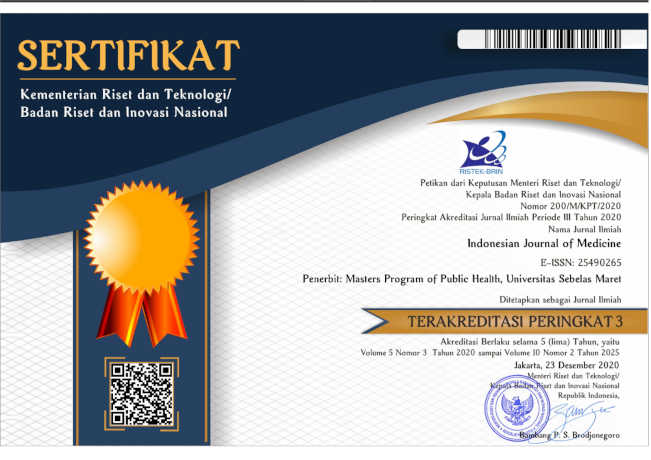The Effectiveness of Electro-acupuncture in Reducing Body Weight in Obese Patients: A Meta-Analysis
DOI:
https://doi.org/10.26911/theijmed.2021.6.3.438Abstract
Background: Obesity is a problem that is starting to be found, not only in urban areas with high socioeconomic status but also in children living in rural areas, even from middle to lower socioeconomic groups. This study aimed to examine the effectiveness of electro-acupuncture in obesity cases.
Subjects and Method: Meta-analysis was carried out with PICO: The population in this study were obese patients aged 16-65. The intervention was in the form of electro-acupuncture therapy. Comparison in the form of sham/ placebo acupuncture. The outcome is weight loss. A meta-analysis study was applied with electronic data sources: Clinical Key, Google Scholar, MEDLINE/PubMed, Science Direct, Scopus. The articles included were full-text with a Randomized Control Trial (RCT) study design. There were 10 articles used in this study with a sample size of 818 people who were divided into two groups (455 people in the acupuncture group and 363 people in the sham/placebo acupuncture group). Articles were analyzed using the Review Manager 5.4 application. The data were analyzed using Standardized Mean difference (SMD) and the heterogeneity of the research sample.
Results: There was high heterogeneity between one experiment and another (I2= 86%; p<0.001), so the Random Effect Model (REM) was used. Electroacupuncture therapy was effective in reducing body weight with a Standardized Mean Different (SMD) of 0.50 compared to false acupuncture (SMD= -0.50; 95% CI= -0.92 to -0.08; p= 0.020).
Conclusion: Acupuncture therapy can lose weight in obesity cases with a Standardized Mean Different (SMD) of 0.50 compared to fake acupuncture.
Keywords: acupuncture, obesity
Correspondence: Nurmila Mutiah. Masters Program in Public Health, Universitas Sebelas Maret, Jl. Ir. Sutami 36A, Surakarta, Central Java, Indonesia. Email: nurmilamutiah77@gmail.com.Mobile: +6287730797747.
Indonesian Journal of Medicine (2021), 06(03): 325-335
https://doi.org/10.26911/theijmed.2021.06.03.10
References
Abdi H, Zirak RG, Barati E, Ghazizadeh H, Rohban M, Mobarhan MG (2020). Effect of body and ear acupuncture on obesity. Obes Med. 19. https://doi.org/10.1016/j.obmed.2020.100257.
Badan Penelitian dan Pengembangan (2018). Riset kesehatan dasar. Kementerian Kesehatan Republik Indonesia. http://www.depkes.go.id/resources/download/info-terkini/hasil-riskesdas-2018.pdf
Belivani M, Dimitroula C, Katsiki N, Apos-tolopoulou M, Cummings M, Hatzito-lios AI (2013). Acupuncture in the treatment of obesity: A narrative re-view of the literature. Acupunct Med. 31(1): 88–97.https://doi.org/10.1136/acupmed-2012-010247.
Cochrane (2011). RevMan 5.3 user guide. The Cochrane Collaboration.
Darbandi S, Darbandi M, Mokarram P, Owji A, Zhao B, Mobarhan MG, Abdi H, et al. (2013). Effects of body elec-troacupuncture on plasma leptin concentrations in obese and overweight. Alternative Therapies. 19(2): 24–31. http//:www.ebscohost.com.
Fu-zhen L (2003). Weight-reducing by electro-acupuncture in 28 cases. J Acupunct Tuina Sci. 1(3): 45–46. https://doi.org/10.1007/bf02852324.
Gao Y, Wang Y, Zhou J, Hu Z, Shi Y (2020). Effectiveness of electroacupuncture for simple obesity: A systematic review and meta-analysis of randomized controlled trials. Evid Based Complement Alternat Med. 2367610. https://doi.org/10.1155/2018/6409389.
Godson DR, Wardle JL (2019). Accuracy and precision in acupuncture point location: A critical systematic review. J Acupunct Meridian Stud. Korean Pharmacopuncture Institute. 12(2): 52–66. doi: 10.1016/j.jams.2018.10.009.
Guo Y, Xing M, Sun W, Yuan X, Dai H, Ding H (2014). Plasma nesfatin-1 level in obese patients after acupuncture: A randomised controlled trial. Acupunct Med. 32(4): 313–317. https://doi.org/10.1136/acupmed-2014-010530.
Hutagalung MSB, Bhetsy A, Miskiyah T (2014). Gizi & dietetika. (2nd ed.). EGC.
Kementerian Kesehatan RI (2018). Fact-Sheet obesitas kit informasi obesitas. Direktorat Pencegahan Dan Pengendalian Penyakit Tidak Menular. http://p2ptm.kemkes.go.id/.
Kepei Z, Shigao Z, Chunyan W, Hanchen X, Li Z (2018). Acupuncture on obesity: Clinical evidence and possible neuro-endocrine mechanisms. Evid Based Complementary Altern Med. 64093-89. https://doi.org/10.1155/2018/6409389
Liang C, Hu H, Wang C, Sun S, Yang W, & Pan L (2016). Randomized Controlled Clinical Trials for Acupuncture Treatment of Abdominal Obesity. Zhen Ci Yan Jiu. 41(2): 159—62, 174. http://europepmc.org/abstract/MED/27323445
Masrul M (2018). Epidemi obesitas dan dampaknya terhadap status kesehatan masyarakat serta sosial ekonomi bangsa. Majalah Kedokteran Andalas. 41(3): 152. https://doi.org/10.25077/mka.v41.i3.p152-162.2018.
Mazidi M, Abbasi PP, Abdi H, Zhao B, Rahsepar AA, Tavallaie S, Parizadeh SM, et al. (2018). The effect of electro-acupuncture on prooxidant antioxidant balance values in overweight and obese subjects: A randomized controlled trial study. J Complement Integr Med. 15(2): 1–5. https://doi.org/10.1515/jcim-2015-0081.
Murti B (2018). Prinsip dan metode riset epidemiologi (5th ed). Surakarta: Program Studi Ilmu Kesehatan Masyarakat, Program Pascasarjana, Universitas Sebelas Maret.
Murti B (2018). Teori promosi dan perilaku kesehatan (1st ed). Surakarta: Program Studi Ilmu Kesehatan Masyarakat, Program Pascasarjana, Universitas Sebelas Maret.
RISKESDAS (2017). Riset kesehatan dasar. Jakarta: Kementerian Kesehatan Republik Indonesia.
Sjarif DR, Gultom LC, Hendarto A, Lestari ED, Sidiartha IGL, Mexitalia M (2014). Rekomendasi ikatan dokter anak indonesia diagnosis, tatalaksana dan pencegahan obesitas pada anak dan remaja Ikatan Dokter Anak Indonesia.
World Health Organization (2020). Obesity. https://www.who.int/en/news-room/fact-sheets/detail/obesity-and-overweight#.
World Health Organization (2000). The Asia-pacific perspective redefining obesity and its treatment. Australia: World Health Organization
Yajuan W (2009). Micro akupunktur in practice. Elsevier Korea LLC.
Yanji Z, Jia L, Guoyan M, Jing L, Huisheng Y, Xianglin C, Hui L, et al. (2018). Acupuncture and related therapies for obesity: A network meta-analysis. Evid Based Complementary Altern Med. https://doi.org/10.1155/2018/9569685.
Yao J, He Z, Chen Y, Xu M, Shi Y, Zhang L, Li Y (2019). Acupuncture and weight loss in Asians. Medicine. 98(33): e16815. https://doi.org/10.1097/md.0000000000016815.











